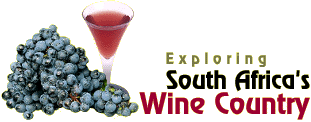 |
 |
 |
|
|||
|
Exploring South Africa's Wine Country
It's a Saturday morning in Stellenbosch. The sun is peeking through overcast skies, competing with a light rain. Nevertheless, middle aged, white South Africans have inundated the Simonsig winery tasting room. Pieter Malan, whose family has owned Simonsig for over 50 years, offers the traditional wine country greeting. He pops open a bottle. Malan makes a toast in Afrikaans. And it sounds oddly familiar: Khesunheit, which goes to the German of gesuntheit "to your health."
Afrikaners broke with European tradition, however, by developing wines to drink with South Africa's rugged, frontier cooking. Locals love a good brai, or barbecue. While Americans associate barbecue with beer, don't mention the malty brew in these parts.
That very good bottle of Cabernet will cost only about $4. A 15-year-old varietal costs under $10. While cheap for Americans, those prices are out of reach for most South Africans. Even four years after the end of apartheid, South African blacks don't benefit much from the region's wine culture. Now, one Cape Town winery is trying to change that. Anzil Adams is an administrator at the Nelson Creek winery, owned by white South African Alan Nelson. Nelson bought the wine farm, or winery, in 1988.
Today children play in front of a neat row of farm worker houses. At the co-op, called "New Beginnings," farm workers decide which grapes to grow. They farm the land and produce the wine, with technical assistance from Nelson. Co-op leader Pete Jacobs says the project has given the workers hope -- and been a financial success. He, like many rural blacks, speaks Afrikaans.
So far, New Beginnings has sold its entire stock of wine, mostly to white South Africans or to European importers. Black South Africans don't drink much premium wine. Co-op members plan to build their own tasting room for tourists, but for the moment, they use the one at the nelson creek wine farm. New Beginnings has produced very drinkable table white and red wines, and is bottling varietals for release next year. Anzil Adams pours a glass.
Adams hopes their co-op becomes a model, showing other South African wineries how to both produce quality wine and share their wealth.
Adams says the New Beginnings wine has become a symbol for the new, post-apartheid South Africa. In Cape Town, I'm Reese Erlich for The Savvy Traveler. For More Information:
|
 | American Public Media Home | Search | How to Listen ©2004 American Public Media | Terms of Use | Privacy Policy |


